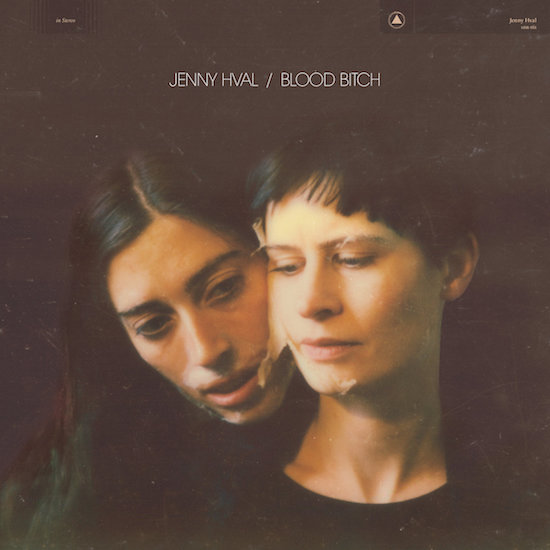Sometimes you need to talk about it. Around the dinner table I explain to some friends how despondent I feel after a month of attempting to decipher the lyrics of Jenny Hval’s Blood Bitch, like some sort of flagellant scholar.
“The paratextual stuff says it’s an album about a vampire,” I say. “So why would she invite me to see it as a literary exercise, and then refuse to make it decipherable? Why does she demand my full attention, and then not reward me for it? Why doesn’t it make any sense?”
Everyone shifts their weight around. My friend offers: "Surely that’s just… the pranksterism of a conceptual artist?" He, and everyone else, is looking at me like I am an idiot. This is his nice way of saying: “She’s taking the piss, mate.”
It turns out that my nervousness about reviewing a ‘conceptual’ record like Blood Bitch made me tone deaf to all the things that make Hval great, including, in large part, her humour. In an attempt to extract some sort of undergraduate-style close-reading essay from the lyric sheet, I actually managed to construct a web of symbolism so dense that I saw the record’s most blissfully obvious jokes as double bluffs.
But after I dealt with my hang-ups, Blood Bitch became glorious and varied. Hval’s one-liners are comedically relieving and unquestionably psychedelic. In ‘Period Piece’ – a song driven from the rear by a shudderingly cathartic bass line – Hval teethes out the lines: “In the doctor’s office / the speculum pulls me open. / Spacing the space. / Accidental sci-fi.” The vagina is a portal to a place where people have ‘blood powers’. She cements it: “Some people find it painful, but all I feel is connected.”
Musically, Blood Bitch plays a lot with drone, feedback and white noise, while simultaneously handing huge portions of songs over to the most melodic and annoyingly catchy work Hval has ever made. ‘Female Vampire’ corruscates while maintaining the “steady gaze” she sings about, while the accordion-style chords create a soothing pulse. ‘Conceptual Romance’ smuggles the phrase “abstract romanticism” into an irresistibly singable chorus.
On the harder side is the nightmarish ‘The Plague’. Hval has previously spoken about the “clarifying” ability of slowing something down, and this is clearly at play when she rewinds, half-speeds and destroys sound recordings during this six-minute hellride. She literally sets fire to the noise: there is certainly the sounds of flames, or at least of matter disintegrating. Equally as affecting, in that same song, is the sound of what might be blood or piss, dripping. This is spliced against another punchline: “Last night I took my birth control with rosé, / while you were sleeping / I was dreaming that you were sleeping, / you were living a life and I was living.”
But Hval retains her crystalline vocals alongside the darkness. Her timbre sounds like software; as though she’s been corporately commissioned to reassure listeners after some apocalyptic event. Therefore you cannot pretend to have missed moments of anguish, as they are confrontingly well annunciated. Throughout various songs she says, “I don’t know who I am,” “I lose myself in the rituals of bad art, in failure,” and alludes to her “combined failures” more than once. Delivered with her unique ability, these statements are full of sadness, but also the sense that Hval performing them is a kind of semi-erotic bloodletting.
As may be clear from this quick tour of Blood Bitch, there is not much of what might be called “a coherent narrative” present, despite every moment being unifyingly bloodspattered. In fact, in ‘Untamed Region’ there’s an extract from an Adam Curtis monologue about nonlinearity. (Again, why I kept on trying to read this album as a gothic novel rather than a celebration of the multi-verse, I have no idea.) And that’s why finally accepting that the vampire thing is somewhat of red herring was so liberating.
Some seem really invested in making this ‘vampire Jenny Hval record’ thing happen, and yes, there is some stuff about a vampire in there. I believe, from the press release, they are Woolfianly named Orlando. And while I understand this allusion may be freeing to some, I found the process of trying to unite the record around one figure, no matter how malleable or paranormal, too claustrophobic.
Blood Bitch, to me, is a palimpsest of ancient themes – menstruation, lunar cycles, nature, witchcraft – that are constantly vibrating against each other, and that don’t need to be centred around a character, or indeed, Hval, to make cosmic sense. They are part of a porous palette, rather than a collection of connatively dense symbols with things to teach us, like when saints hold stuff in cathedral friezes.
In her ability to summon all these tangents into one form, Hval signals that she understands where the rewards from art and music intersect, and how nonsense can be beautifully exploited. Like a lot of ‘serious listening’ music, it often works best when you permit yourself some passivity. By both embracing my mate’s reminder of her pranksterism, and viewing Hval as a conceptual artist, rather than a conceptual musician, an artist, or indeed a poet, one can be freed to enjoy this as the eccentric pop album that it is. I’ve never had a chorus earworm with the word ‘capitalism’ in it before, and I think I probably won’t ever again. And that’s part of the reason why letting her semi-lucid universe of blood, spells and sleep wash over you is so rewarding.
With thanks to Alice and Nathan



